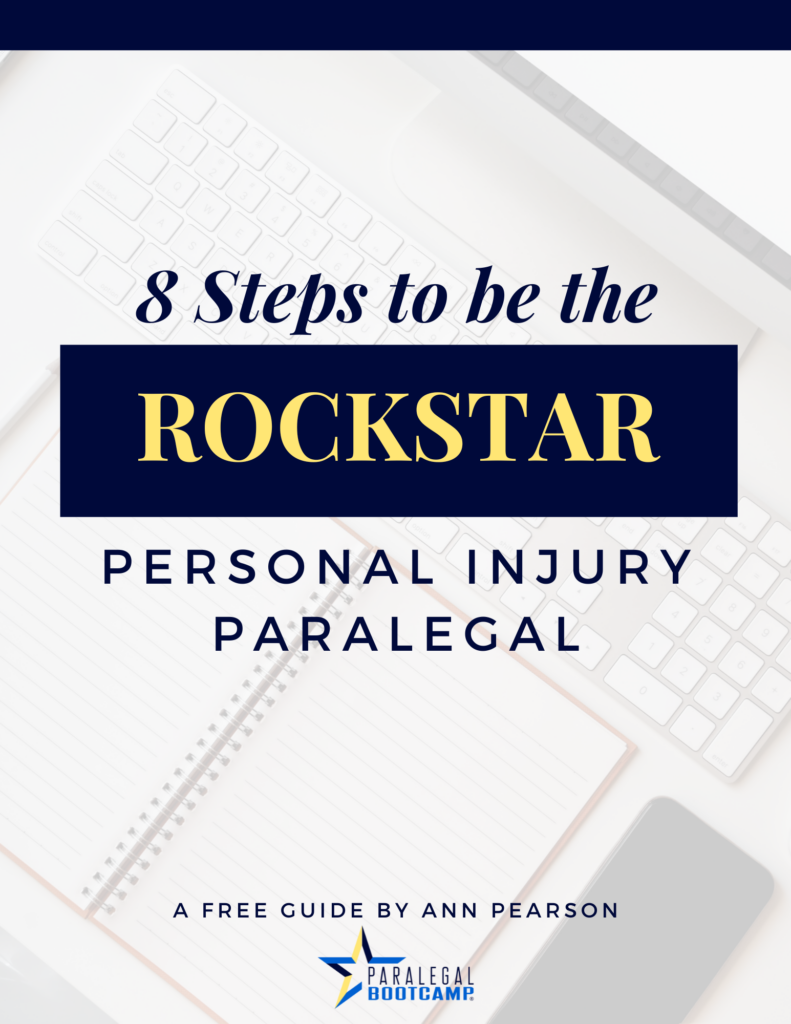Paralegals can bring immense value to their firms when they adopt the mindset and habits of a project manager. Each case is, in fact, a project, with its own set of stakeholders, goals, and constraints.
A paralegal’s role is to know the objectives of each case, to employ systems to efficiently drive it toward resolution and to keep attorneys, clients, experts, vendors, and all other stakeholders informed and invested throughout the case’s trajectory – in other words, to work their cases like a project manager.
1. Define objectives
The Project Management Institute defines a project as “a temporary endeavor undertaken to create a unique product, service, or result.”
This aptly describes legal cases, as well. When identifying the objective of your case, you and your attorney need to understand the desired outcome for the client.
Knowing the client’s goals is essential to tailoring your approach effectively. If your client prioritizes a quick resolution over a potentially larger financial win, that will affect how your team engages in discovery and negotiations.
Conversely, a client seeking to make a larger statement – perhaps to the opposing party or even the public – requires an entirely different strategy.
Clearly defining objectives early on saves time and facilitates decision-making regarding strategy, budget, resources, and timeframe. It also sets realistic expectations for the client and gives them confidence that their case is on a purposeful path to an established goal.
2. Employ systems
Effective project managers – and effective paralegals – use systems at both the task and process level to achieve objectives efficiently.
👉 Routine tasks like drafting forms, sending emails, and following up on deadlines should be repeatable and organized for consistency.
👉 Create banks of pre-approved forms, email templates, and checklists for tasks handled frequently.
👉 Consolidate these resources in one location—whether in a shared drive or project management software—to ensure quick access and minimize the time spent searching through case files for previously used materials.
When developing templates and forms, it’s important to keep them as neutral as possible, free from case-specific information to avoid accidentally carrying over details from one case to another.
🔓 Pro tip: search YouTube for tutorials on the “Design Mode” feature in Microsoft Word to create fillable forms in a word processor environment.

Free Strategy Guidebook for
New Litigation Paralegals
Are you ready to fast-track your litigation paralegal career?!
Our free guidebook reveals three powerful strategies that will set you up for success in your journey. If you’re ready to seize this opportunity and thrive as a litigation paralegal, sign up below, and get started now!
As for checklists, in his book The Checklist Manifesto, surgeon Atul Gawande writes that while they might “seem almost ridiculous in [their] simplicity,” checklists are an important tool to address the problem that “the volume and complexity of what we know has exceeded our individual ability to deliver its benefits correctly, safely, or reliably.”
Consider the many technologies, systems, and processes you use every day. It’s easy to miss something in a multi-step task, especially when there is a time crunch or many other tasks waiting for you.
Checklists for seemingly simple tasks (motion drafting, e-filing, calendaring deadlines, etc.) ensure complete work that you can feel confident about. That final check is even more important for documents and projects that have gone through many hands and iterations.
Do you want to learn more about how to incorporate project management principles into your work as a paralegal (in any practice area)? Get the Paralegal Boot Camp’s Project Management for Paralegals.
At a higher level, systemizing the entire case process requires strategic planning.
Spend time with your attorney mapping out each phase of a typical case, from the initial consultation to case closure.
Identify key stakeholders and their responsibilities at each stage, as well as the events that trigger new tasks or deadlines.
You might create a master process list or a spreadsheet that can be duplicated for new cases.
Many firms use project- or case-management software, which can house template processes for different case types. You may need to add or remove certain steps depending on the goals of your client, but this resource will empower you to proactively drive your cases forward, and when the client calls asking for an update, you will have a clear overview of the current status.
Trial Prep Boot Camp
Getting ready for trial is stressful and rewarding at the same time.
What if your next trial didn’t involve 14-hour work days?
We’ll show you to be so prepared for your next trial that you will actually enjoy going to trial…even if you work for the Master of Procrastination!

3. Communicate, collaborate, evaluate
Two core principles of project management are teamwork and stakeholder engagement, and these are equally vital in the legal setting. Each case relies on input, expertise, and actions from numerous individuals, both inside and outside the firm.
The goals and actions of stakeholders—whether clients, attorneys, experts, or even opposing parties—can influence the direction of the case and the resources required. Therefore, effective and consistent communication is critical.
Internal communication ensures that the team remains aligned and that work is not duplicated.
Tools like project management software and shared calendars offer a central hub for asynchronous access to case information. Something as simple as hitting “Reply All” on email chains can prevent communication gaps.
With every filing, event, or significant milestone, consider who on the internal and external teams should be aware of the development and proactively share relevant information.
More paralegal resources on communication skills can be found in this podcast episode.
External communication, particularly with clients, is just as crucial.
Keeping clients updated on notable events—such as the filing of a scheduling order, service of discovery, or progress in negotiations—helps them feel involved and reassures them that their case is being actively managed.
Regular check-ins, even when there are no new developments, foster transparency and may prompt clients to share important information they might otherwise withhold.
Lastly, ongoing evaluation of both the process and the outcomes is essential. Regularly assessing what is working well and identifying areas for improvement will refine your processes and lead to better-defined roles and clearer expectations.
Client feedback is also a valuable tool for growth. Offering clients the chance to leave a review not only benefits the firm’s marketing efforts but can also serve as a critical resource for internal improvements.

Free Guide for
Personal Injury Paralegals
Are you ready to be a rockstar personal injury paralegal?
When you’re starting out, it’s hard to know where to even start. We’ve got you covered! Here is your checklist.
The Paralegal Boot Camp gives you 8 actionable steps to get you started right now on a path to success.
Our free guide shares the 8 steps you need to take right now to start standing out at your firm.
Adopting a project management approach empowers paralegals to manage cases effectively and ensures that both the legal team and clients remain focused and aligned.
With these practices, paralegals can play an invaluable role in increasing efficiency and advancing the case process in service of favorable outcomes.
Meet the author

Claire McGehee, ACP is an independent contractor through her paralegal services business, CPM Paralegal, LLC. She works with Dawson & Sodd, PLLC in Dallas, Texas as part of a team that secures just compensation for property owners impacted by government takings. She has a B.A. in Humanities from Providence College, a Paralegal Certification from Auburn University, and received the NALA CP designation in 2019 and ACP designation in 2024.

























